|
|
|
Sort Order |
|
|
|
Items / Page
|
|
|
|
|
|
|
| Srl | Item |
| 1 |
ID:
172170
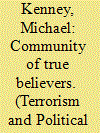

|
|
|
|
|
| Summary/Abstract |
This paper applies the concept of “communities of practice” to al-Muhajiroun (“the Emigrants”), an outlawed activist network that seeks to create an Islamic caliphate in Britain and the West through activism and proselytizing. Responding to recent studies on terrorism learning and adaptation, the author argues that focusing exclusively on the outputs of learning is unsatisfactory. Instead scholars should analyze learning as a process and unpack the causal mechanisms behind it. To support his within-case analysis, the author draws on extensive field work, including interviews and ethnographic observation. Newcomers to al-Muhajiroun learn the community’s norms and practices through repeated interactions with more experienced activists. These interactions take place in study circles and through companionship. Activists also learn by doing, preaching the Emigrants’ Salafi-Islamist ideology at da’wah stalls and protesting against the West’s “war on Islam” at demonstrations. The more they do, the better they become at performing the network’s high-risk activism, and the more deeply committed they become to its community of practice. However, far from allowing activists to adapt seamlessly to all challenges, the Emigrants’ insular and dogmatic community of practice creates its own problems, hindering its ability to innovate, expand, and thrive in an increasingly hostile environment.
|
|
|
|
|
|
|
|
|
|
|
|
|
|
|
|
| 2 |
ID:
191847
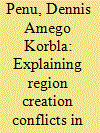

|
|
|
|
|
| Summary/Abstract |
For the first time in its history, Ghana held a referendum in 2018 to divide some of its regions to create new ones. Though the regions are purely administrative, the division faced resistance in some areas and not in others. This study combines qualitative comparative analysis with process tracing to show that the resistance occurred within regions with relatively high support for the opposition party, but only in the combined presence of (traditional) elites competing from either side of the region and controversies regarding claims to (traditional) political authority. Further, it finds a bottom-up mechanism of the resistance, evolving as the threatened interests of stakeholders grew from the community to the regional, national and diaspora levels. As in other African cases, this suggests that the sources of conflicts in Africa are not so much about ethnic differences but more about elites’ unequal access to political and economic resources.
|
|
|
|
|
|
|
|
|
|
|
|
|
|
|
|
| 3 |
ID:
192244


|
|
|
|
|
| Summary/Abstract |
The use of chemical weapons (CW) by Iraq during the Iran-Iraq War appears to have been subject to far less decisive US responses than similar accusations against Syria during the Syrian civil war. However, the two instances have not yet been subject to direct scholarly comparison. This article treats the Iraqi and Syrian instances as two distinct cases and compares US actions to prevent, investigate and deter CW use on each occasion. After demonstrating that the US responded more decisively to the allegations against Syria, we then employ process tracing to locate both cases within existing theoretical discussions of US intervention in the global South generally, as well as CW norm enforcement in particular. In doing so, we propose that, in addition to other factors including the US aspiration to world dominance and its resultant framing of its material and security interests as well as a lesser regard for citizens of the global South, the anti-US stance of either the CW perpetrator or victim can also affect how the US responds to accusations of CW norm violation. This casts further doubt on the veracity of stated humanitarian motives for US intervention abroad.
|
|
|
|
|
|
|
|
|
|
|
|
|
|
|
|
| 4 |
ID:
081295


|
|
|
|
|
| Publication |
2008.
|
| Summary/Abstract |
The International Monetary Fund (IMF) is an organization charged with the responsibility to observe governance experiments to enhance institutional competitiveness in its member states. While the IMF's role in propagating certain forms of institutional competitiveness in developing economies is commonly discussed, less emphasis has been placed on how the IMF seeks to transfer policy knowledge, and to learn from, the governance of institutional competitiveness in its developed Western member states. This article provides a corrective by providing an analysis of IMF staff and Executive Board advice on taxation and monetary reform to two 'coordinated' market economies, Denmark and Sweden, and two 'liberal' market economies, Australia and New Zealand, from 1975 to 2004. The article traces how IMF staff and Executive Board advice compares with actual changes to taxation and monetary regimes in these four small open economies. In sum, this article explores the notion that the IMF is an 'experimentalist governance' organization that seeks to build its comparative knowledge of policy reform, providing a contrast with the common depiction of the IMF as an institution that dictates 'neoliberal' policy homogeneity
|
|
|
|
|
|
|
|
|
|
|
|
|
|
|
|
| 5 |
ID:
140399
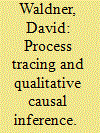

|
|
|
|
|
| Summary/Abstract |
This essay critically reviews this symposium's essays on process tracing and security studies by James Mahoney, Andrew Bennett, and Nina Tannenwald. It covers three major issues that have not been adequately addressed by previous writings on process tracing: the relationship of single case studies to more general causal claims, the conceptualization of causation, and the criteria of valid causal inference. It introduces the “completeness standard,” which combines causal graphs, event history maps, and invariant causal mechanisms. The completeness standard, it argues, bridges unit-level causal inferences and average treatment effects, invokes an epistemologically warranted conceptualization of causation, and better satisfies existing standards of causal inference by making unit homogeneity assumptions more credible.
|
|
|
|
|
|
|
|
|
|
|
|
|
|
|
|
| 6 |
ID:
192885
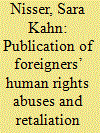

|
|
|
|
|
| Summary/Abstract |
Institutions that monitor violations of human rights, particularly of victims living outside their home countries, will often name the victims’ countries of origin in their reports. This article looks at this understudied practice and argues that it unintentionally creates bilateral retaliation dynamics between the victims’ home country and the country violating the victims’ rights. The article defines retaliation and explains why countries care about violations of their citizens’ rights that take place abroad. Through empirical analysis, the article shows that countries retaliate in response to violations of their citizens’ rights which have been identified and publicized by the UN Committee Against Torture. I use a new dyadic dataset on the abuse of foreigners’ human rights, as identified by Amnesty International and the Committee Against Torture, to test the hypothesis that a country's abuse of foreigners from a peer country is associated with that peer country's abuse of rights of citizens from the observed country. I then examine the Syrian–Lebanese case to trace the process of retaliation. These analyses support the hypothesis that countries retaliate against violations of their citizens’ rights abroad.
|
|
|
|
|
|
|
|
|
|
|
|
|
|
|
|
| 7 |
ID:
157101


|
|
|
|
|
| Summary/Abstract |
This article offers a process-mechanism explanation of securitization. To make the case for a process-mechanism account more concrete, I use interpretivist process tracing to explain the crisis episode of the Sun Sea, a Thai cargo ship carrying Sri Lankan asylum-seekers, and the securitization of irregular migration in Canada. Drawing on interviews and grey literature, the article shows how securitization was possible and under what conditions, and argues that ideational dispositions of security organizations induced state officials toward a security interpretation of the the Sun Sea. The article aims to demonstrate that process-mechanism explanations represent a compelling methodological alternative with which to trace and explain securitization. The article sees itself as part of a broader refinement of a sociological variant of securitization theory. It seeks to examine and enhance the contribution that this ‘post-Copenhagen’ approach – its core assumptions and theoretical framework – makes to the analysis of securitization.
|
|
|
|
|
|
|
|
|
|
|
|
|
|
|
|
| 8 |
ID:
121424


|
|
|
|
|
| Publication |
2013.
|
| Summary/Abstract |
This article provides a systematic understanding of international norm emergence and illuminates the various strategic pathways to altering global dialogue and standards of practice. It traces the steps leading to global norm emergence and identifies the range of conditions that are necessary or sufficient for potential norms to move from one step to the next. Accordingly, it analyzes the progress of six separate international norm agendas to develop a more systematic understanding of the process of global norm creation, which can be applied to fledgling efforts to establish a new regime of international migrants' rights. Based on this examination, it introduces a typology that categorizes the stages of norm development and the range of possible outcomes.
|
|
|
|
|
|
|
|
|
|
|
|
|
|
|
|
| 9 |
ID:
158213
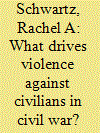

|
|
|
|
|
| Summary/Abstract |
Dominant theories of mass violence hold that strategic concerns in civil war drive the deliberate targeting of civilians. However, the causal mechanisms that link strategic objectives to large-scale violence against civilians remain underspecified, and as such the causal logics that underpin each remain blurred. In this article, we identify and explicate four plausible mechanisms that explain why armed groups would target, for strategic purposes, civilians in war. We then turn to the peak period of violence during the Guatemalan armed conflict to assess which mechanisms were most prevalent. Specifically, we leverage unique archival data: 359 pages of military files from Operation Sofía, a month-long counterinsurgent campaign waged in the northwestern Ixil region. Through process tracing of real-time internal communications, we find that state actors most commonly described the civilian population as loyal to rebel forces; violence against civilians was a means to weaken the insurgency. Troops on the ground also depicted the Ixil population as ‘winnable’, which suggests that security forces used violence in this period to shape civilian behavior. These findings are most consistent with the idea that mass violence in this case and period was a coercive instrument to defeat insurgents by punishing civilians for collaboration. The evidence from this period is less consistent with a logic of genocide, in which the purpose of violence would be to destroy ‘unwinnable’ civilian groups. Our analysis illustrates how a mechanism-centered approach based on process tracing of conflict archives can help uncover logics underlying civilian killing.
|
|
|
|
|
|
|
|
|
|
|
|
|
|
|
|
|
|
|
|
|